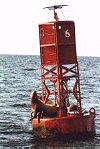 ACTION ON OIL VAPOR URGED
ACTION ON OIL VAPOR URGED
September 25, 1999
BEN SPIESS, Anchorage Daily News
A citizen's watchdog group wants more protection against air pollution
from the oil tanker docks in Valdez because oil production is predicted to
rise, not fall.
"With more oil, we're going to need more means to protect the air in
Valdez," said Stan Stephens, board member of the Prince William Sound
Regional Citizens Advisory Council, a group that oversees tanker shipping
in Valdez. The RCAC board passed a unanimous resolution Friday calling for
Alyeska Pipeline Service Co. to install equipment to capture toxic fumes
that waft off oil during tanker loading.
Two of three loading berths in Valdez have equipment to gather the
fumes. Regulations limit how much oil can be loaded without vapor recovery.
A third berth has no vapor recovery equipment but is seldom used.
However, that could change if BP Amoco and Atlantic Richfield Co.,
Alaska's two biggest oil producers, combine operations. Last week, BP
released a rosy forecast that predicts that, if its $29 billion Arco
takeover is approved, oil production by 2005 will be 150,000 barrels more
than previously forecast.
That prediction could reverse a long decline in oil production from
Alaska's North Slope fields. It also would undercut the logic the industry
used in 1995 when it argued that outfitting all tanker loading berths with
equipment to capture fumes would be a waste since production was declining
and only a small amount of oil would be loaded at the third berth.
But the new production forecast may mean more loading at the unprotected
berth three, Stephens fears, and put Alyeska in violation of federal
emission regulations.
"We're committed to meeting the law," said Tracy Green, spokeswoman for
Alyeska, which is owned by seven major oil companies and runs the tanker
port. "If the production numbers change, we'll look at whether we need to
change our equipment at berth three."
RCAC also wants Gov. Tony Knowles to take up the issue. RCAC plans to
ask that a new vapor recovery system at berth three be made a part of the
negotiations between the state and BP about
the Arco takeover, said Stan Jones, RCAC spokesman. Knowles' spokesman Bob
King said he was unsure whether the vapor recovery could be made part of
the negotiations. The governor's demands have been made public and
negotiations begun.
Almost all of Alaska's North Slope oil production - about 1 million
barrels each day - is loaded onto tankers in Valdez, making the town one of
the nation's biggest oil terminals.
Thousands of pounds of toxic fumes waft off oil during loading onto
tankers at Valdez. During the 1980s, Alyeska argued that emissions were not
causing significant air pollution and that elaborate vapor recovery systems
were unnecessary. But government studies found something different - as
much as 5,000 tons of toxic benzene came off the oil each year.
Residents complained about a blue haze and a scent of gas. Fishermen
joked darkly about setting off explosions in Port Valdez by lighting a
cigarette.
In a 1995 agreement with the federal Environmental Protection Agency and
the state Department of Environmental Conservation, Alyeska agreed to
outfit vapor recovery systems. Alyeska spent $100 million building the
systems, Green said.
The oil companies balked at outfitting the third berth, arguing that by
the year 2000 production would fall below 1.1 million barrels a day - the
amount both sides agreed could be managed by two loading berths.
BP now forecasts that North Slope production will now reach 1.24 million
barrels a day by 2004. If its Arco takeover is approved, the company plans
to increase development spending in Alaska - money that will drive more
production.
The 1995 agreement set up emissions quotas, amounts of oil that can be
loaded at berth three without vapor recovery, to accommodate for
maintenance or loading snafus at the two other berths. In 1999, Alyeska can
load on average 205,000 barrels a day, said John Stone of DEC. But those
quotas decrease annually, giving the company less flexibility with the law.
If production rises as quotas fall, Alyeska could be in tight spot,
Stephens said.
"This is the right thing to do for people in Valdez," said Stephens, a
Valdez resident, tour boat operator and oil company critic. "Those
companies make too much money not to protect the air quality."
* Reporter Ben Spiess can be reached at bspiess@adn.com
Related Links
Anchorage Daily News-- Anchorage Daily News Website
Alyeska-- Alyeska Pipeline Company
EPA-- Environmental Protection Agency's Webpage
|

